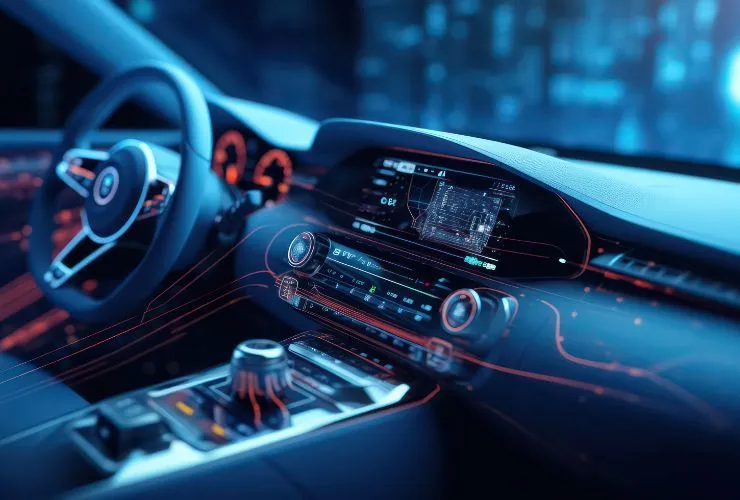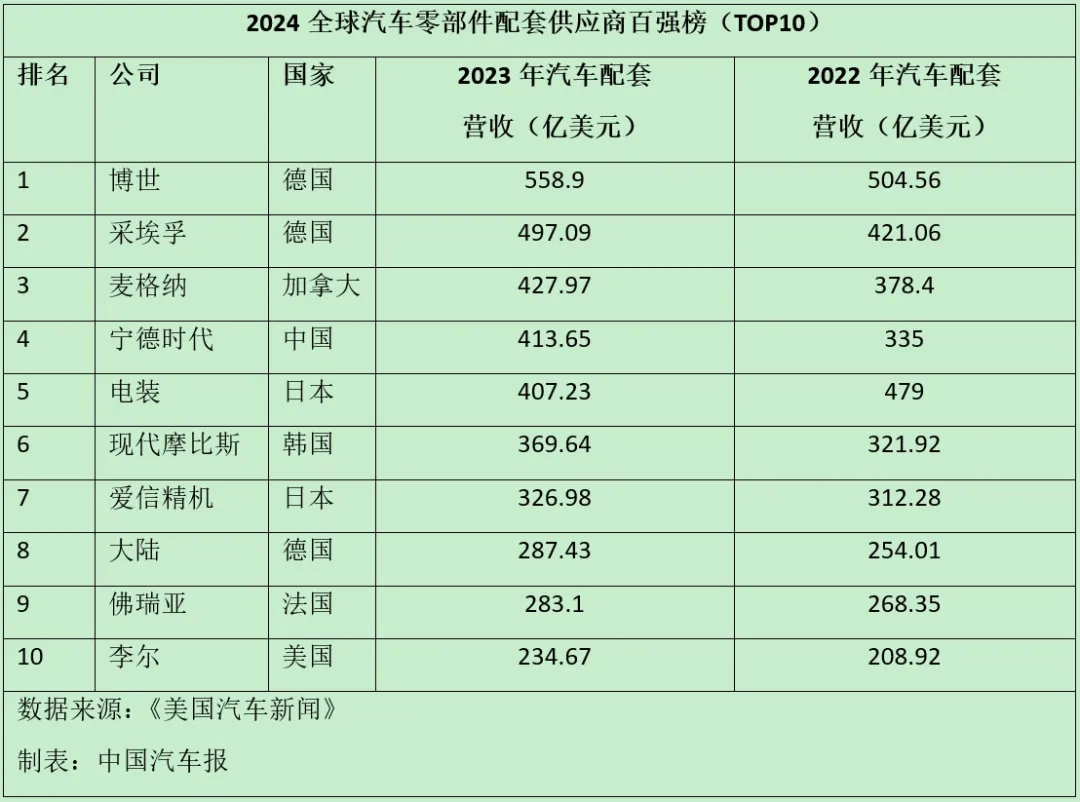
On June 23, Automotive News released its 2024 list of the top 100 global auto parts support suppliers. This year's list has three more obvious changes. One is that there are two more Chinese companies on the list, namely Gotion High-tech and Sanhua Automotive, bringing the total number of Chinese companies on the list to 15. The second is that CATL has been promoted to the fourth place, just after Bosch, ZF and Magna, the three traditional international parts giants. Third, with the strong recovery of the major global automotive markets in 2023, most parts suppliers are seeing steady gains in performance.
However, it is worth noting that the slowdown in demand for electric vehicles in Europe and the United States, to accelerate the transformation of the pressure on the supplier, and the continued "price war" also put pressure on the OEMs, and the pressure has been transferred to the supplier.

Most suppliers realize positive growth
In terms of revenue, most of the component suppliers realized positive revenue growth in 2023 along with the recovery of major global automotive markets. The average revenue of the automotive business of the 100 suppliers on this year's list grew by about 9% year-on-year. Among them, Bosch Group remains the world's largest automotive parts supplier, with automotive segment revenue of nearly $56 billion in 2023, up from nearly $50.5 billion the previous year. This is mainly due to its top performance in both traditional fuel vehicles as well as electric vehicles.
Fellow German parts supplier ZF came in second, with automotive segment revenue of nearly $50 billion in 2023, up from $42.1 billion the previous year. "2023 is a year of big decisions for ZF in several areas." ZF CEO Hauser Koh said. It was during this year that ZF decided to merge the Passenger Car Chassis Technologies and Active Safety Technologies business units, into a new integrated Chassis Solutions business unit, which was completed earlier this year. The spin-off of the Passive Safety Systems business unit has also been initiated, and may be sold in whole or in part, or an initial public offering, in the future. In addition, ZF has established a joint venture with Foxconn for passenger car chassis systems.
As for Magna, the largest parts supplier in North America, revenue in 2023 was $42.8 billion, up 13% year-on-year, while net profit was $1.2 billion, soaring 105% year-on-year. Magna's operating results are said to be largely dependent on customers' passenger car and light truck production in North America, Europe and China, all of which have realized production growth in 2023.
China's Ningde Times, which supplies batteries to many mainstream automakers, rose to fourth place thanks to the growth in global electric vehicle production and sales. According to South Korean research organization SNE, Ningde era power battery in 2023 in the global market share of 36.8%, the seventh consecutive year in the world's top.
In contrast, Denso's revenue declined year-on-year, and it was the only company in the top 10 or even the top 15 to see a decline. Following them were BASF at No. 17, BorgWarner at No. 21, and Toyota Synthetic at No. 50. Overall, the decliners are in the minority, and most companies are still optimistic about their 2023 performance.
"Inward roll" pressure to suppliers
Of course, there are a series of hidden worries behind the revenue growth of parts suppliers in 2023. Europe and the United States electric vehicle market cooling, for those electrification transition "too much force" parts manufacturers is not friendly, BorgWarner is a typical example, failed to reach the 2023 electrification break-even commitment.
Bosch boss Stefan Hartung believes that the next few decades will still need internal combustion engine vehicles, and to realize the global electrification of all vehicles, it will take at least 30 to 35 years. Add to this the fact that, as of today, most OEMs are still losing money on their electrification business and have chosen to cut parts and logistics costs in order to reduce the cost of electric vehicles, adding uncertainty to suppliers' electrification strategies.
Especially into 2024, the price war is intensifying and the involution is intensifying, which directly impacts the parts suppliers. In April this year, the 30th anniversary of the celebration of China, Valeo China President Zhou Song pointed out that, with the great changes in China's auto industry, "price war" from the host plant to the upstream supply chain, auto parts suppliers are facing enormous cost pressure.
In May this year, the reporter participated in a closed-door symposium on the industry, a foreign-funded parts giants in China executives spit out that the OEMs are playing a price war, but at the expense of innovation and product performance, and sometimes come across some extreme examples of OEMs customers directly requesting price cuts, "not 5% or 10%, or even not 20%, higher, and it is very simple! To drop, there is no room for any other bargaining, do not drop that will face the future of the new project can not get, very simple and brutal.
Also in May of this year, Ford issued a memorandum to its electric vehicle parts suppliers, the initiative of the suppliers to put forward cost-cutting initiatives, to work together to reduce vehicle production costs, in order to support the company's electric vehicle business to achieve profitability. Currently, Ford's electric vehicle business continues to suffer huge losses.
In addition to pressure to reduce costs, Stellantis Group CEO Tang Weishi not long ago proposed to give up some of the parts suppliers, their own production of auto parts, in order to reduce the high cost of electrification transition. For some suppliers, this is obviously bad news, meaning that orders will simply disappear.
Hartung previously in an interview with foreign media, the future expressed pessimistic judgment: "the next one to two years, the company will be difficult to achieve the expected sales and profit targets. 2024 will be more difficult than expected, 2025 may also be the same." And now it seems that it may be prophetic.
Declaration: This article comes from the Automotive News Canada and Automotive News.If copyright issues are involved, please contact us to delete.